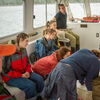Ashland looks to generate investment around new forest industry product
 Courtesy / WholeTrees Structures
The town of Ashland has launched an initative to lure investment in structural round timber, seen in this photo, an environmentally friendly and sustainable product.
Courtesy / WholeTrees Structures
The town of Ashland has launched an initative to lure investment in structural round timber, seen in this photo, an environmentally friendly and sustainable product.
The town of Ashland is launching a development program, Original Mass Timber Maine, that aims to build markets for structural round timber, a low-cost and carbon-friendly building product that is a perfect fit for the state's forest industry, those behind the initative say.
The three-year project, funded by a grant to the town from the Northern Forest Center and Forest Opportunity Roadmap coalition (FOR Maine), is aimed at generating a sales pipeline for the Ashland area based on the timber product. Structural round timber products are up to 50% stronger than milled lumber, and are used for columns, beams, trusses and other structrual features.
The product is cheaper to produce than other engineered wood products, like cross-laminated timber, officials said at a news conference Thursday. It also sequesters carbon at a higher rate that other wood projects, and makes use of timber that may not be suitable for milled lumber.
"The opportunity for the northern forest with structural round timber is quite large," said Greg Cabral, a market development expert who was hired last month to lead the Ashland initiative. "With East Coast mass timber markets growing, this project will help Ashland situate itself to take advantage of an estimated $130 million total addressable market for high-gross margin SRT products."
Logs used for SRT can be priced significantly higher than those used in other markets, which generally pay up to $120 a ton depending on log quality. The initiative intends to ramp up production of SRT in partnership with private entities, creating jobs, as well as increasing revenue for independent logging contractors.
Cabral said Ashland's initiative will also pave the path for other northern forest communities to do the same, and help diversify the wood-products market in the region.
The project fits into FOR Maine's goal to grow the state's forest industry by $4 billion in the next four years, Brianna Bowman, program director for the forest industry collaboration, said at the news conference.
"We are working to build and promote a bio-economy strategy for the state that is grounded in growth and reinvestment in heritage industries and supported by attracting new investment to the state, which drives towards diversification to emerging products," Bowman said. "We are doing all this with an eye toward environmental and economic resilience for the state as a whole and also for our historic mill communities."
She said the OMT initiative, with a focus on spurring investment as well as supporting the town and region, aligns with those goals.
'No-brainer' for Ashland
Ashland, with a population of 1,350 in Aroostook County, is at the gateway to the northern forest. Ashland positioning itself as the hub of the effort is a "no brainer," said Cyr Martin, the town manager.
“We understand how important it is for us to develop our economy in a sustainable manner while utilizing the resources available to us. This initiative will do exactly that," he said.
Ashland is surrounded by 3.4 million acres of forest land, he said. "That's a lot of woods, and a lot of opportunity."
Seven Islands Land Co., which has operations in Ashland, Bangor and Rangeley, is one of the private entities involved in the initiative and Dan Lamontagne, its president, heads Original Mass Timber Maine's steering committee.
"We believe the new wood demand it will create, particularly for use in commercial building markets, will give forest industry stakeholders the confidence needed to invest in facilities to service that demand,” Lamontagne said in a news release. “Besides the promise of economic development this initiative highlights Maine’s abundant forest resource and the excellent job our industry does to manage it sustainably.
"Wood is the only mainstream building product derived from a renewable resource and it also helps fight climate change. SRT represents another great opportunity to reinforce forests as a natural climate solution," he said.
Cabral, at the news conference, said that the building construction industry is one of the largest contributors to climate change. Tress also sequester carbon, and the nature of the SRT, means that carbon is not released, making it a more environmentally friendly building material.
Kayla Caron, partner and principal with Simons Architects, said at the news conference that architects have a big say in what products get used in building. The environmental advantages of SRT, as well as its aesthetic value, make it a product that people want to use. She said it's also appealing as a local and sustainable product.
"They're really eliminating the barriers to using these products in design and construction," she said. "We're all very well-poised to look into this and see how it might fit in to our projects, to really help the stewards of the environment. I'm really excited about that."
The $600,000 to launch the program came from a $150,000 grant from FOR Maine and $450,000 from the Northern Forest Future Forest Economy Initiative, coordinated by the Northern Forest Center ina cooperative effort of the U.S. Economic Development Administration, U.S. Endowment for Forestry & Communities.










0 Comments